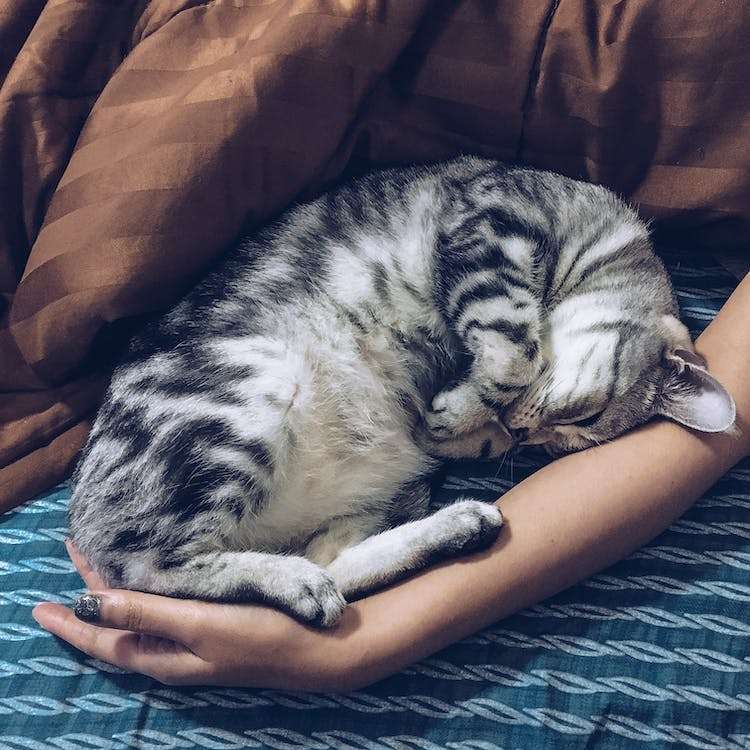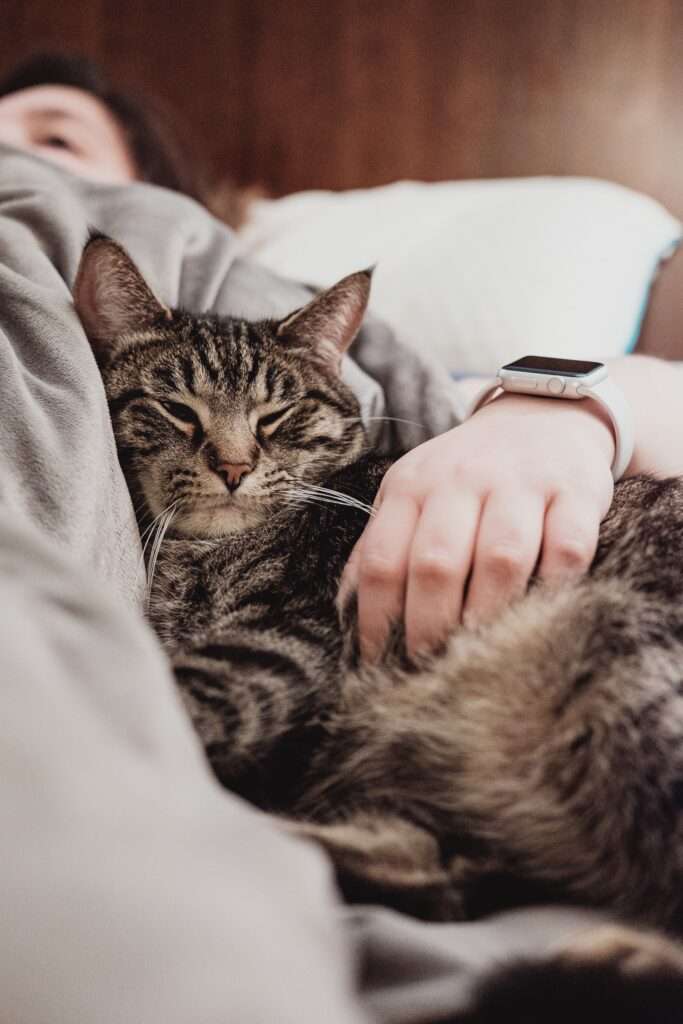Why Does My Cat Sleep Pressed Up Against Me? The Psychology of Cat Cuddling
Do you ever wonder why your cat loves sleeping next to you? It’s a prevalent trait among most of our feline companions, and it frequently signifies both fondness and reliance. But there could also be other explanations behind it that might not be known to most cat owners. In this article, we’ll explore the reasons why your cat sleeps pressed up against you.
Why Cats Like to Sleep Pressed Up Against Their Owners

Cats have fascinating instincts and behaviors, and one of them is their fondness for sleeping pressed up against their owners. This behavior can be attributed to several factors that highlight their natural instincts, social bonding, and comfort needs.
- Instinctual Protection: Despite being domesticated, cats still retain some of the survival instincts of their wild ancestors. By snuggling up against their owners, cats can sense any potential threats and feel protected. This behavior is particularly evident in multi-cat households or outdoor cats who need to remain vigilant of their surroundings.
- Social Bonding: Cats are inherently social creatures and enjoy interacting with their owners. By choosing to sleep next to you, your cat is expressing trust, affection, and a desire to strengthen the bond between you. It’s their way of seeking comfort and closeness with their beloved human companion.
- Temperature Regulation: Cats have a higher natural body temperature compared to humans. Sleeping close to you allows them to exchange heat, keeping them warm and cozy, especially during colder seasons. Your body heat becomes a source of comfort and helps regulate their own body temperature.
Understanding why your cat prefers to sleep pressed up against you can deepen your bond and enhance your appreciation for their unique behaviors. It’s a testament to the special connection between you and your feline friend, reflecting their need for security, social interaction, and warmth. Embrace these moments of shared sleep, as they are a testament to the strong and loving bond you share with your cat.
Understanding Your Cat’s Sleeping Habits
Cats have unique sleeping habits that can vary from one feline friend to another. By familiarizing yourself with your cat’s sleeping patterns, you can provide them with the perfect sleeping environment tailored to their needs and preferences.
It’s no secret that cats love to nap, and they do so for a significant portion of their day. On average, cats sleep for about 12-16 hours, but their sleep is divided into multiple shorter periods rather than one long stretch like humans. This is because cats are crepuscular animals, meaning they are most active during the twilight hours of dawn and dusk.
When it comes to choosing their sleeping spots, cats can be quite particular. Some cats prefer cozy hiding spots where they feel secure and protected, such as under beds or in enclosed cat beds. Others enjoy basking in the warm sunlight, finding the perfect patch of sunshine to curl up in. Pay attention to your cat’s preferred locations and provide them with comfortable options that meet their desires.
Additionally, cats have various sleep postures that they adopt depending on their mood and level of relaxation. You may notice your cat curled up into a tight ball, creating a cozy and compact sleeping position. On the other hand, they might stretch out luxuriously, showcasing their flexibility and enjoying a deep sleep. Cats may even choose to sleep on their backs, exposing their vulnerable bellies as a sign of trust and contentment.
The Benefits of Sleeping with Your Cat
Sharing your bed with your beloved feline companion can bring numerous benefits that enhance both your sleep quality and overall well-being. Here are some of the notable advantages of snoozing alongside your cat:
- Enhanced Sleep Quality: Sleeping with your cat can contribute to a more restful sleep. The comfort and relaxation of having your cat close can help reduce stress and anxiety, allowing you to drift off into a deeper, more rejuvenating slumber. The soothing presence of your cat can create a calming atmosphere in the bedroom, promoting a peaceful sleep environment.
- Alleviation of Loneliness: For those who live alone, having a cat to sleep with can alleviate feelings of loneliness. The companionship and affectionate presence of your feline friend can provide a sense of comfort and emotional support, helping you feel more secure and connected during the night.
- Health Benefits: Research suggests that spending time with pets, including sleeping with them, can have positive effects on mental health. Interacting with your cat before sleep can help reduce symptoms of anxiety and depression, promoting a sense of relaxation and well-being. Furthermore, the gentle warmth and pressure of your cat next to you can provide natural pain relief and alleviate discomfort, promoting a more comfortable sleep experience.
- Increased Bonding and Socialization: Sharing your bed with your cat offers an opportunity for increased bonding and strengthening of your relationship. Spending quality time together during sleep fosters a deeper sense of trust, companionship, and affection. It creates a special closeness between you and your cat, deepening the bond that you share.
However, it’s important to consider potential risks associated with sleeping with your cat. Allergies and zoonotic illnesses can be a concern for some individuals. If you have allergies, ensure proper hygiene, such as regular vacuuming, washing bedding, and keeping your bedroom well-ventilated.
It’s also advisable to consult with a healthcare professional for guidance on managing allergies. Additionally, maintaining your cat’s overall health through regular veterinary care and hygiene practices can help reduce the risk of transmitting zoonotic illnesses.
The Risks of Sleeping with Your Cat

While the idea of sleeping with your beloved feline companion may sound delightful, it’s essential to be aware of potential risks to ensure the safety and well-being of both you and your cat. Here are a few considerations to keep in mind:
- Allergies: If you have allergies, sleeping with your cat can exacerbate symptoms. Cat dander and hair can trigger allergic reactions, causing sneezing, itching, and respiratory discomfort. It’s important to consult with a healthcare professional to manage your allergies effectively and consider strategies to reduce exposure, such as keeping your bedroom clean and well-ventilated.
- Zoonotic Diseases: Cats can carry certain zoonotic diseases that can be transmitted to humans. These include toxoplasmosis, cat scratch fever, and ringworm. While the risk of contracting these diseases is generally low, it’s crucial to maintain good hygiene practices, such as washing your hands after handling your cat and ensuring your cat receives regular veterinary care to minimize the chances of transmission.
- Behavioral Issues: Sleeping with your cat can sometimes lead to behavioral challenges. For instance, if your cat becomes overly reliant on sleeping with you, they may experience separation anxiety when you’re not around. This can result in excessive vocalization, destructive behavior, or inappropriate elimination. Additionally, some cats may become overly possessive or territorial, displaying aggression towards you or other pets when sharing a bed. It’s important to address any concerning behaviors through proper training, enrichment, and seeking guidance from a professional behaviorist if needed.
By being aware of these potential risks and taking appropriate measures, you can ensure a safe and harmonious sleeping arrangement with your cat. Remember to prioritize your health, communicate regularly with your veterinarian, and provide your cat with alternative cozy sleeping options if needed. Together, you can enjoy the benefits of companionship while maintaining a healthy and balanced environment for both of you.
Tips for Safe Sleeping with Your Cat
If you’re eager to share your sleeping space with your furry companion, it’s important to prioritize safety and comfort. Here are some valuable tips to ensure a harmonious snooze:
- Maintain a Tidy Bedroom: Regularly clean your bedroom and keep it free from excessive dust, allergens, and clutter. This helps create a clean and healthy sleeping environment for both you and your cat.
- Stay Up to Date with Vaccinations and Parasite Prevention: Ensure that your cat is current on vaccinations and receives regular preventive treatments for fleas, ticks, and other parasites. This helps safeguard their health and reduces the risk of any potential transmissible diseases.
- Provide a Cozy Cat Bed: Offer your cat their own dedicated sleeping space, such as a soft and cozy cat bed. Cats appreciate having a comfortable spot that they can call their own, and it can encourage them to choose their bed over yours.
- Set Boundaries and Rules: Establish clear boundaries and rules for sleeping arrangements right from the start. This helps prevent any potential behavioral issues and ensures that everyone understands the sleeping dynamics. For example, you might decide to designate certain areas of the bed as off-limits for your cat or establish a consistent routine for bedtime.
Do bear in mind that each cat is unique, and their preferences may vary. Observe your cat’s behavior and adjust accordingly to ensure their safety and happiness. By implementing these tips, you can enjoy a safe and cozy slumber with your beloved feline friend, strengthening your bond and creating cherished moments together.
Conclusion
In summary, catching some Z’s with your kitty can prove to be a positive experience for both you and your feline friend. It can help to strengthen your bond, improve your sleep quality, and provide health benefits.
While the benefits are plentiful, it’s crucial to remain mindful of potential risks and take necessary precautions. By familiarizing yourself with your cat’s unique sleeping patterns and providing them with a safe and snug sleeping environment, you can revel in the advantages of snoozing with your cherished feline friend.
Remember, each cat is an individual with their own preferences and needs. Paying attention to their cues and adjusting accordingly will ensure a harmonious and restful sleep for both you and your cat. So snuggle up, savor the warmth and companionship, and create cherished moments as you embark on dream-filled adventures with your beloved feline companion.
Frequently Asked Questions
Q: Why does my cat sleep pressed up against me?
A: Cats sleep pressed against their owners for a sense of security, comfort, warmth, and familiarity with their scent.
Q: Is it normal for cats to sleep so close to their owners?
A: Yes, it is normal for cats to sleep close to their owners as it strengthens the bond, provides comfort, and a sense of security.
Q: Should I allow my cat to sleep with me?
A: Allowing your cat to sleep with you is a personal choice. If it doesn’t disrupt your sleep or cause discomfort, it is generally safe to let them sleep with you.
Q: Why does my cat sleep between my legs?
A: Cats may sleep between your legs because it offers warmth, comfort, and a sense of security. Being nestled between your legs can provide a cozy spot for rest.
Q: Why does my cat sleep on my chest?
A: Cats may sleep on your chest to feel close to you and enjoy the warmth and comfort your body provides. The rhythmic rise and fall of your chest as you breathe may also be soothing to them.
Q: Why does my cat sleep by my head?
A: Cats may sleep by your head as it provides a safe and secure location near their trusted human companion. They may also be attracted to the scent of your hair and skin.
Q: Why does my cat sleep at my feet?
A: Cats may sleep at your feet to be close to you while maintaining some personal space. It allows them to feel safe and secure without being in direct proximity to your upper body.
Q: Why does my cat sleep with me and not my husband?
A: The reasons why a cat chooses to sleep with one person over another can vary. It may be due to a stronger bond with you, associating you with positive experiences, or simply finding your sleeping habits and location more appealing. Cats have individual preferences when it comes to sleeping arrangements.
Q: Is it safe to sleep with my cat?
A: Sleeping with your cat is generally safe with proper precautions like flea prevention, cleanliness, and consulting a professional if you have health concerns.
Q: How can I encourage my cat to sleep in their own bed?
A: To encourage your cat to sleep in their own bed, provide a cozy space nearby with familiar scents, soft bedding, and positive reinforcement.
Q: What if my cat suddenly stops sleeping close to me?
A: Sudden changes in sleeping habits may indicate underlying issues, so monitor your cat’s behavior for signs of distress or illness and consult a veterinarian if concerned.
Q: Should I be worried if my cat snores while sleeping pressed against me?
A: Occasional snoring is normal, but excessive snoring or respiratory symptoms should be evaluated by a veterinarian to rule out underlying problems.





